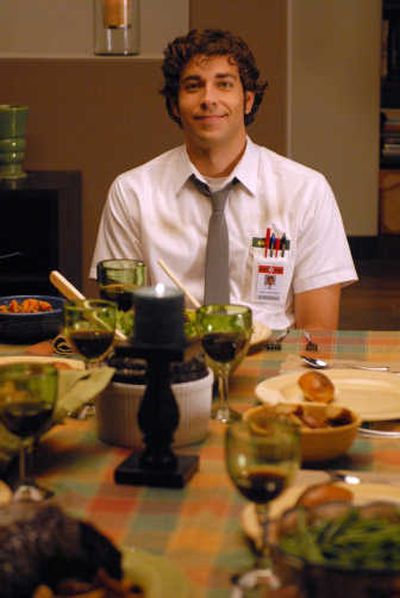Networks embrace nerds

The word is nerd.
It flourished in the halls of high schools as an ugly tag hung on kids targeted for being too smart, too different or too oblivious of the accepted paths to popularity.
The stereotype is of a chess-playing, computer-programming, “Star Trek”-quoting, pocket-protector-wearing, band-marching brainiac who cares nothing for sports, fashion or conformity.
But almost anyone who marched to the beat of his or her own drum in school was in danger of being labeled a nerd, a geek, a dork.
Chuck Bartowski, the lead character on NBC’s “Chuck,” certainly fits the stereotype.
An unlikely hero, this self-described computer geek mistakenly downloads data that turns him into America’s most important secret agent.
In the words of the delightful rookie show’s producers, he is “trading in his pocket protector for a bulletproof vest.”
“Chuck” is just one example of a message echoing across the prime-time landscape this season: It’s cool to be a nerd.
The nerd herd has all but taken over Monday nights. Freshman series “Chuck,” a quirky blend of action and comedy, joins the sophomore sensation “Heroes” on NBC’s Monday lineup.
The comic-bookish “Heroes” features the breakout character Hiro (Masi Oka), a time-bending comic-book geek who loves “Star Trek.”
The same night that NBC debuted “Chuck,” CBS unveiled “The Big Bang Theory,” a comedy starring Johnny Galecki and Jim Parsons as brilliant but socially inept scientists with a beautiful, free-spirited neighbor (Kaley Cuoco).
Scheduled against this newcomer is another fledgling comedy, the CW’s “Aliens in America,” with Dan Byrd as a bright 16-year-old whose awkward, naive ways have made him an outsider in school.
The simultaneous embracing and shattering of the nerd stereotype has been going on for a few seasons. This geekification groundwork was established by the popularity of such prime-time characters as Zach Braff’s J.D. on NBC’s “Scrubs” and David Krumholtz’s Charlie Eppes, the resident math genius on CBS’ “Numb3rs.”
Last season saw the welcome additions of Oka’s Hiro and America Ferrera’s wonderfully brainy but fashion-challenged title character on ABC’s “Ugly Betty.”
And this fall, TV’s geek squad has grown to the point of becoming a full-blown programming trend.
ABC’s “Pushing Daisies” features Lee Pace as a shy, sensitive loner made even more of an outsider by the discovery of a magical gift.
The CW’s “Reaper” stars Bret Harrison as a slacker forced to become a bounty hunter for the devil.
“Everyone is throwing around ‘geek’ and ‘nerd’ and all this,” says Zachary Levi, who has the title role on “Chuck.” “I would say cool-challenged, if we can coin that phrase, or jock-challenged.
“I find myself very much being able to be myself, I guess, playing video games and being a nerd, which I really, really am in so many ways.”
Levi says playing Chuck has been liberating, allowing him to find his “inner nerd.”
Yes, the derogatory term is being embraced by many who are proud to call themselves nerds. Perhaps that’s because the very interests that make someone seem geeky in high school often pay off big in real life.
The nerd of high school sometimes ends up running the world. Think Bill Gates or Steven Spielberg.
Still, why have those regarded as unattractive in high school become so attractive to us as TV characters?
One reason may be that far more viewers can relate to Chuck, Betty and Hiro than to dashing spies, glamorous models and square-jawed superheroes.
“Absolutely,” says Josh Schwartz, “Chuck” executive producer and co-creator. “I think everybody in the audience sees themselves as Chuck.
“It gives you that sense of ‘maybe I could succeed.’ “
Another reason for the proliferation of these characters might be that many of the people fashioning television shows felt like nerds or geeks in high school.
“As a writer, you want to write what you know,” says Schwartz, who created “Chuck” with writer-producer Chris Fedak.
“And certainly, as Chris and I can attest, we know many more writers who resemble Chuck than, say, (‘24’ superspy) Jack Bauer.”